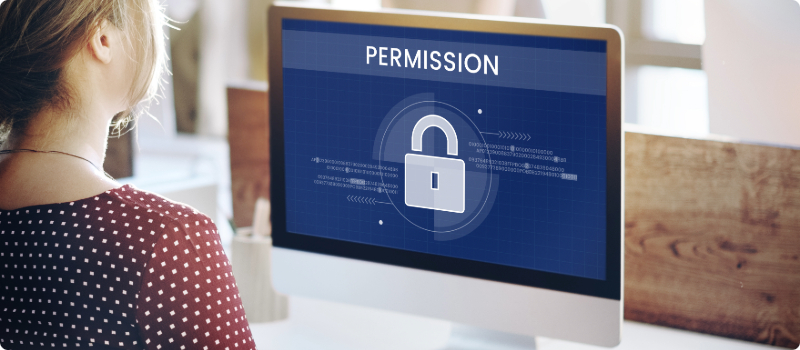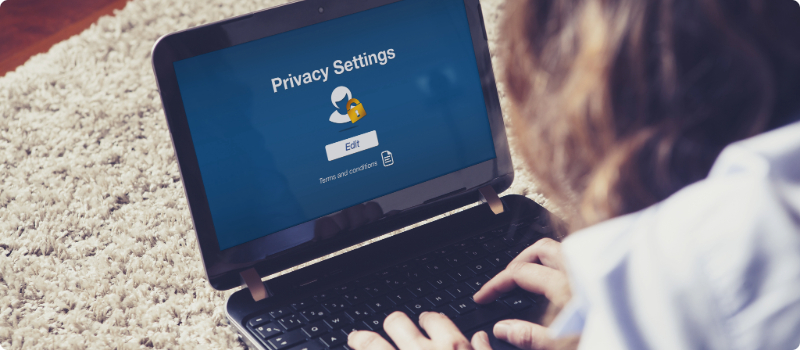
The 11 Best Ways to Protect Yourself from Identity Theft
Updated October 14, 2021 . AmFam Team
Identity (ID) theft is never a fun situation. By taking proactive measures to protect your personal information, you can limit your exposure to risks. Learn how to protect yourself and your data from identity theft with our best tips and resources.

What is identity theft?
Identity (ID) theft is when highly sensitive, personal information about you or someone else has been wrongfully obtained by someone — usually a cybercriminal or hacker — without that person’s consent. The data is then used for the purpose of fraud or deception, as the hacker can use the stolen personal information to create an identity, often mimicking the person from whom the data was acquired. This false persona can be used to drain your bank accounts, gain illegal entry into your work or home computers and even for the purpose of loan applications.

Is identity theft the same thing as identity fraud?
Technically, identity fraud occurs after ID theft, as the data stolen is used for the purpose of impersonation. However, both identity theft and identity fraud are often used interchangeably to mean the same thing. For example, if you have suffered identity fraud, you have very likely fallen prey to identity theft.
How to Protect Your Data from Identity Theft
Below are our quick tips on how to protect your identity. Take control of your privacy by putting these 11 simple ID protection tips into practice.

1. Create Strong Passwords
Thieves love easy username and password combinations because they are the keys to your personal information. By being a little more data security savvy, however, you'll make things much less easy for them! Try to use various passwords for different accounts and include a mix of numbers, letters and symbols. Check out our tips on how to create a strong password that’s super secure and easy to remember!
You might think your phone is a convenient place to keep track of your passwords, but in the event your phone is stolen, it’s best to keep your passwords elsewhere to avoid being a victim of identity theft. Instead, write them on a piece of paper and tuck them safely away.
Alternatively, you can use a password management tool or device that encrypts and safely stores your passwords. Although there can be a monthly fee, password management tools are excellent for protecting your identity and keeping track of your passwords. Some of the most popular password managers include LastPass (Opens in a new tab), NordPass (Opens in a new tab) and RoboForm (Opens in a new tab).

2. Be Smart About Updating Passwords
You’ve probably heard you should update your passwords as frequently as you should change your toothbrush, about every three months. Lately, though, experts aren’t sure if that’s guaranteed to protect your identity since hackers are pretty savvy about clever password tricks. Pair that with their advanced hardware and software, and you may find that simply updating your password might not be enough.
If you're trying to think of the best course of action, see tip number one and create a random password. Experts agree that if you have the slightest suspicion your identity and data might have been hacked, you definitely should change those passwords ASAP.

3. Check Your Credit Report
Monitoring your credit report allows you to get a detailed look at your credit history. Once you get a copy of your credit report, which you’re entitled to a free copy of once a year from each of the three national credit bureaus (Equifax, Experian and TransUnion), go over it thoroughly to see if any fraudulent transactions or accounts are listed. Getting a free copy once a year means you can get a free credit report every four months from one of the credit bureaus; just make sure you use a different bureau each time.
If you do notice any debts that aren’t yours or accounts you didn’t open, follow these steps to report identity theft.

4. Review Your Bank and Credit Card Accounts
Get in the habit of carefully looking over your bank and credit card accounts every month. If you notice any funny business, call your bank or credit card company right away.
You can also set up fraud alerts to notify you when a suspicious purchase is made on your accounts. If you plan on going on vacation, call your bank to let them know where you’ll be — especially if traveling internationally — to avoid erroneous fraud alerts while you’re having fun.
Keep an eye on the news for data breaches at banks, retailers, credit agencies and other companies that store customers’ personal information so you can act before a thief has a chance to use your data.

5. Don’t Overshare on Social Media
Feel free to post that picture of your fermented soybean sushi roll, but steer clear of posting any personal identifying information. Thieves are hunting social media for easy prey, and unassuming info like your email address, birth date and even your children’s names are used for scamming and identity theft.
A lot of social media and email accounts also offer two-step verification, which requires the site to check with you if you log in from a new place. Sign up for this to further safeguard your accounts and personal information from identity theft.

6. Shield Your Computer
Keep personal and financial information secure on your computer with firewall, virus and spyware protection software. Just make sure you’re downloading these tools from a trusted source.
To take personal data protection even further, you can install a virtual private network, or VPN, to further protect your information as it travels the internet. It can also hide your IP address, preventing scammers from tracking your data back to your personal network.

7. Don’t Take the Bait
Scam artists love to “phish,” which means they catch victims by pretending to be trustworthy sources like banks, stores, government agencies and so on. Most commonly, people phish others over the phone and through emails, but they’ll try to get you through regular mail, too.
Legitimate companies don’t typically request information in this way, so don’t be afraid to ask questions when a business calls, and never give out your personal information over the phone or email.
If you would like more tips on how to avoid phishing, we've collected a few to share.

8. Safeguard Your Social Security Card
Never give out your entire Social Security number (SSN) over the phone or online. Usually, a company will only ask for the last four digits of your SSN, so if someone asks for your full number, you should be wary.
If you're a person who routinely carries your Social Security card in your wallet or purse, consider taking it out and storing it in a secure place for added safeguards and to protect yourself from identity theft if it falls into the wrong hands.

9. Don’t Leave a Paper Trail
Identity thieves have no problem dumpster-diving for your personal info. Although this sounds like a silly way to collect personal information in the digital age, it happens more than you’d think! So, this begs the question: What can I do to protect my identity from dumpster-diving criminals? Here are a few ways you can keep your bank statements and other sensitive data from falling into the wrong hands:
- Enroll in “paperless” billing with your bank. Most major banks offer the paperless option, which is more secure and protects your data by eliminating the paper trail. No paper, no trail!
- Invest in a paper shredder. If you want to ensure your sensitive printed documents are useless to dumpster divers, we recommend a micro-cut shredder. These shredders are just like older shredders, but rather than cutting documents into long strips, they shred them into much smaller “micro” bits.
- Don’t write down passwords by hand. This is especially important if you work in a large office setting. It’s just too easy for anyone to snap a quick pic of your login credentials.

10. Be Aware of Credit Card Skimming
A “skimmer” is essentially a card reader that grabs the data off a card’s magnetic stripe, making it easy for a thief to create cloned cards or break into your bank account to steal money. These skimmers are designed to be small and inconspicuous, typically appearing like an ordinary piece of equipment. Always inspect the device you’re using your card with and pay close attention to catch any irregularities.
In short, always keep an eye on your card or pay with cash when you can.

11. Consider Identity Theft Insurance
Identity theft protection coverage helps you quickly and conveniently get back on track if you’re victimized by identity scammers. It’s a smart, simple and affordable way to financially recover and get support when you need it most, especially when it comes to contacting credit reporting companies, law enforcement, etc.


Protect Your Identity with American Family Insurance
It takes just a few minutes to put these ID theft protection safety practices into place. And with that small time investment, you’ll gain the peace of mind that comes with knowing you’re protecting what matters most.
Contact your American Family Insurance agent today to talk about how you can add identity theft coverage to your homeowners policy. Remember, ID theft protection is affordable, fast and can be added to your existing policy with ease!
This article is for informational purposes only and based on information that is widely available from sources not associated with American Family Mutual Insurance Company, S.I. nor its Operating Companies. While we do our best to provide helpful resources, we make no guarantees or promises about the reliability, accuracy, or any potential outcomes. This information does not, and is not intended to, constitute legal or financial advice. You should contact an appropriate professional for advice specific to your situation.
*Customers who bundle home and auto insurance policies may save up to 23% on both policies together (as of December 2023). Discounts may vary by state, property, policy form and company underwriting the home and/or auto policy. Discounts may not apply to all coverages on a home or auto policy.


